Essential Oils For Psoriasis: Do They Work?
Explore the various benefits of aromatic essential oils for relief from psoriasis.
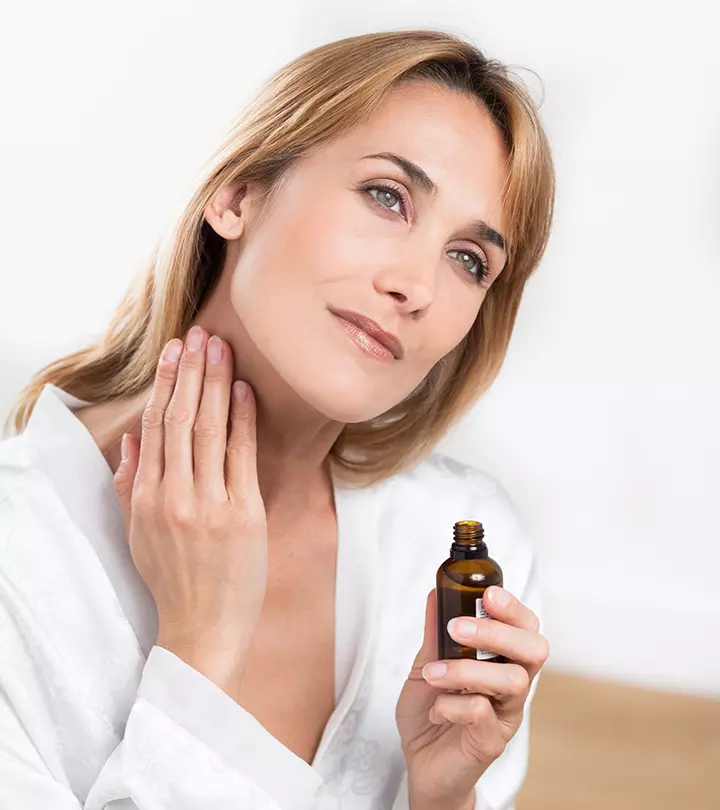
Image: Shutterstock
Psoriasis is a chronic inflammatory condition that causes itchy plaques on the skin and makes it scaly and flaky. Multiple triggers like stress, UV exposure, and other environmental factors may cause flare-ups. While this auto-immune condition cannot be treated, many claim that you can use essential oils for psoriasis management. In this article, we discuss the essential oils that may help manage psoriasis and how you can use them. Keep reading to know more.
In This Article
What Is Psoriasis, And What Are Its Causes?
Psoriasis is a chronic inflammatory condition
that causes raised itchy plaques, flakes, and scales on the skin. It is not contagious and the cause is unknown.
A survey was conducted by the National Psoriasis Foundation to find out the effectiveness of complementary and alternative medicines (CAMs) for psoriasis in 2018. Most respondents were female (68.5%), and the majority were white (84.1%). 41% of respondents used alternative therapies, and those with severe psoriasis were more likely to use them than those with nonsevere psoriasis, and 42.7% would recommend these therapies to others.
However, certain factors can trigger the symptoms and cause flare-ups, which may last for weeks or even months. Here are some of the triggers you should look out for:
- Stress: Stressful events may cause psoriatic flare-ups and increase the lesions (1). You can relieve stress by trying relaxation techniques and meditation and working with a therapist.
- Skin Injuries: The Koebner phenomenon states that a skin injury or trauma in patients with psoriasis may trigger new psoriatic lesions and inflammations. For instance, injuries like scratches, incisions, viral infections, and radiation exposure may cause psoriasis flare-ups (2).
- Medical Conditions: Medical conditions like depression and cardiometabolic syndromes can affect the immune system and cause psoriatic flare-ups. You may experience redness, itchy plaques, lesions, and scaling. Other existing conditions like cardiovascular diseases, non-Hodgkins lymphoma, diabetes, and arthritis may also cause flare-ups (3),(4). Some medications, like beta-blockers, synthetic antimalarials, non-steroidal anti-inflammatory drugs (NSAIDs), lithium, and tetracyclines, used to treat various conditions may trigger flare-ups(5).
- Environmental Factors: Extreme weather conditions and factors like humidity and sunlight may cause flare-ups .
 Did You Know?
Did You Know?Essential oils are common home remedies to manage psoriasis flare-ups. Here are some essential oils that you may try.
Key Takeaways
- Psoriasis is a chronic skin condition characterized by red, scaly patches on the skin. Factors such as stress, skin injury, and exposure to sunlight may trigger flare-ups.
- Essential oils such as tea tree oil, lavender oil, or hemp seed oil may help manage flare-ups and inflammation.
- To avoid any allergic reaction, essential oils should be mixed with carrier oils such as coconut oil or castor oil.
Essential Oils That May Help Manage Psoriasis
1. Tea Tree Oil
You Will Need
- 2-4 drops of tea tree oil
- 1-2 tablespoons of any carrier oil
How To Use It
- Mix the two oils.
- Apply the mixture to the affected area.
- Leave it on for at least 30 minutes and wash it off.
- Apply it twice a day.
Why It Works
Tea tree oil contains terpinen-4-ol, a compound with anti-inflammatory properties, which may help soothe itchiness, redness, and inflammation (7). Hence, many skin care enthusiasts believe in using tea tree oil for psoriasis.
2. Lavender Oil
You Will Need
- 4-5 drops of lavender oil
- 1-2 tablespoons of coconut oil
- 1-2 drops of peppermint oil (optional)
How To Use It
- Combine the oils.
- Apply the blend to the affected area.
- Leave it on for at least 30 minutes.
- Apply it 2-3 times a day.
Why It Works
Lavender oil contains major phytoconstituents linalool and linalyl acetate, which can soothe psoriatic inflammation (8).
3. Geranium Oil
You Will Need
- 2-4 drops of geranium oil
- 1 tablespoon of coconut oil
How To Use It
- Dilute geranium oil with coconut oil.
- Apply the mixture to the affected area.
- Leave it on for 30 minutes and wash it off.
- Do this twice every day.
Why It Works
Geranium can be used to soothe psoriasis symptoms. A study showed that the anti-inflammatory properties of rose geranium reduced inflammation during psoriasis flare-ups (9), (10) .
4. Peppermint Oil
You Will Need
- 3-7 drops of peppermint oil
- 1-3 tablespoons of carrier oil
How To Use It
- Mix the two oils.
- Apply it over the affected skin.
- Leave it on for 30 minutes, and then wash it off.
- Apply twice daily.
Why It Works
Peppermint oil is one of the most recommended essential oils for itching. It can also curb inflammation and alleviate symptoms of psoriasis (11).
5. Chamomile Oil
You Will Need
- 3-5 drops of chamomile oil
- 1-2 tablespoons of jojoba oil
How To Use It
- Mix the oils.
- Dab it over the affected area with your finger or a cotton swab.
- Leave it on for 30 minutes and then wash off.
- Apply twice daily.
Why It Works
Chamomile is often used to soothe inflammation and psoriasis flare-ups (12). It also helps relieve stress, a major trigger for psoriasis inflammation.
6. Hemp Seed Oil
You Will Need
- 2-5 drops of hemp seed oil
- 1-2 tablespoons of carrier oil
How To Use It
- Mix the hemp seed and carrier oils.
- Apply the mixture to the affected area.
- Leave it on for 30 minutes and then wash it off.
- Do this twice every day.
Why It Works
Hemp seed oil can relieve dryness, inflammation, and itching caused by psoriasis and help soothe the skin (13).
7. Frankincense Oil For Psoriasis
You Will Need
- 3-5 drops of frankincense oil
- 1-2 tablespoons of any carrier oil (coconut oil or jojoba oil)
How To Use It
- Mix frankincense oil with a carrier oil.
- Apply the mixture to the affected area.
- Leave it on for at least 30 minutes and wash it off.
- Apply it twice a day.
Why It Works
Frankincense oil contains anti-inflammatory properties that soothe swelling, itchiness, and irritation associated with psoriasis (14).
Essential oils should not be used alone. You have to mix them with carrier oils before applying them to the skin. Here is a list of carrier oils you can use.
Carrier Oils To Pair With Essential Oils
1. Coconut Oil
Coconut oil can be used alone or in combination with other essential oils to reduce psoriatic inflammation
. Research shows that coconut oil, paired with salicylic acid, coal tar, and other ingredients, can minimize psoriasis symptoms (15).
Ayurveda promotes Winsoria oil (a herbal coconut-based oil) to manage psoriasis (16). Coconut oil may help improve inflammation and scales formed on the scalp due to psoriasis (17), (18).
2. Jojoba Oil
Jojoba oil helps manage psoriasis symptoms (19). It also has antifungal properties and can speed up wound healing.
3. Castor Oil for Psoriasis
Castor oil contains ricinoleic acid, a compound with anti-inflammatory properties. It may help soothe psoriatic inflammation (20). Castor oil can be applied to the skin directly or used as a base with other essential oils.
 Quick Tip
Quick TipEssential oils are known as potential allergens. You have to be careful while using them to avoid any adverse effects.
Side Effects Of Essential Oils
If you are allergic to essential oils, they may worsen your condition and cause:
- Redness
- Itching
- Hives
- Dryness
- Swelling
Consult a doctor and perform a patch test before using oils and other natural remedies.
Frequently Asked Questions
Is CBD oil good for psoriasis?
CBD contains anti-inflammatory effects that may aid in treating skin disorders such as psoriasis. However, more research is needed in this regard. Hence, it is recommended to consult with a physician before using it (21).
Is rosemary oil good for psoriasis?
Anecdotal evidence suggests that rosemary’s anti-inflammatory properties may help treat chronic skin disorders such as psoriasis.
Learn about the use of essential oils in psoriasis. Take a look at this video to learn more about when and how to use these oils effectively to soothe your skin and manage psoriasis symptoms.
Psoriasis is a chronic skin condition that causes itchy, red patches on the skin. While the exact cause of psoriasis is unknown, certain factors such as stress, medical conditions, or weather changes may aggravate this skin condition. You can use a few essential oils for psoriasis management, such as tea tree oil, lavender oil, or chamomile oil. Since essential oils are not to be applied directly to the skin, dilute them with carrier oils like coconut or castor oil. Finally, you should conduct a patch test before applying an essential oil.
References
Articles on StyleCraze are backed by verified information from peer-reviewed and academic research papers, reputed organizations, research institutions, and medical associations to ensure accuracy and relevance. Read our editorial policy to learn more.
- Psychosomatic Paradigms in Psoriasis: Psoriasis, Stress and Mental Health
https://www.ncbi.nlm.nih.gov/pmc/articles/PMC3890931/ - Koebner Phenomenon Leading to the Formation of New Psoriatic Lesions: Evidences and Mechanisms
https://www.ncbi.nlm.nih.gov/pmc/articles/PMC6893164/ - Psoriasis
https://www.thelancet.com/journals/lancet/article/PIIS0140-6736(20)32549-6/fulltext - Diagnosis and Management of Psoriasis
https://www.ncbi.nlm.nih.gov/pmc/articles/PMC5389757/ - Psoriasis: a Review of Existing Therapies and Recent Advances in Treatment
https://www.researchgate.net/publication/328138246_Psoriasis_A_Review_of_Existing_Therapies_and_Recent_Advances_in_Treatment - The Burden of Skin Diseases
https://www.optum.com/business/federal-government/health-policy.html - Critical Role of Environmental Factors in the Pathogenesis of Psoriasis
https://onlinelibrary.wiley.com/doi/abs/10.1111/1346-8138.13806 - Tea Tree Oil as a Novel Anti Psoriasis Weapon
https://pubmed.ncbi.nlm.nih.gov/22473218/ - Anti-Psoriatic Effect of Lavandula Angustifolia Essential Oil and Its Major Components Linalool and Linalyl Acetate
https://pubmed.ncbi.nlm.nih.gov/32623016/ - Rose Geranium Essential Oil as a Source of New and Safe Anti-Inflammatory Drugs
https://pubmed.ncbi.nlm.nih.gov/24103319/ - Essential Oils Used in Aromatherapy: a Systemic Review
https://www.sciencedirect.com/science/article/pii/S2221169115001033 - Antimicrobial Activity of Selected Essential Oils Against Streptococcus Suis Isolated from Pigs
https://onlinelibrary.wiley.com/doi/full/10.1002/mbo3.613 - Current Approaches to the Treatment of Psoriasis
https://wchh.onlinelibrary.wiley.com/doi/pdf/10.1002/psb.122 - Diterpenoids and Triterpenoids From Frankincense Are Excellent Anti-psoriatic Agents: An in silico Approach
https://www.ncbi.nlm.nih.gov/pmc/articles/PMC7330179/ - Potential Implications of Ayurveda in Psoriasis: a Clinical Case Study
https://www.sciencedirect.com/science/article/pii/S0975947620301303 - Complementary and Alternative Medicine Treatments for Common Skin Diseases: a Systematic Review and Meta-Analysis
https://www.jaadinternational.org/article/S2666-3287(20)30075-4/pdf - Diagnosis and Management of Psoriasis and Psoriatic Arthritis in Adults
https://www.sign.ac.uk/assets/sign121.pdf - Jojoba Oil: Anew Media for Frying Process
https://juniperpublishers.com/ctbeb/pdf/CTBEB.MS.ID.555952.pdf - Management of Psoriasis With Aloe Vera Extract in a Hydrophilic Cream: a Placebo-Controlled, Double-Blind Study.
https://onlinelibrary.wiley.com/doi/pdf/10.1046/j.1365-3156.1996.d01-91.x - Effect of Ricinoleic Acid in Acute and Subchronic Experimental Models of Inflammation
https://downloads.hindawi.com/journals/mi/2000/360629.pdf - Therapeutic Potential of Cannabidiol (CBD) for Skin Health and Disorders
https://www.ncbi.nlm.nih.gov/pmc/articles/PMC7736837/ - Tea Tree Oil For Psoriasis: Benefits, Uses, And More
- Scalp Psoriasis Vs. Dandruff: What Are The Differences?
- 13 Best Soaps For Psoriasis Symptoms
- 8 Best Homeopathy Treatments For Psoriasis
Read full bio of Dr. Priya Gill
Read full bio of Anjali Sayee
Read full bio of Ramona Sinha
Read full bio of Swathi E





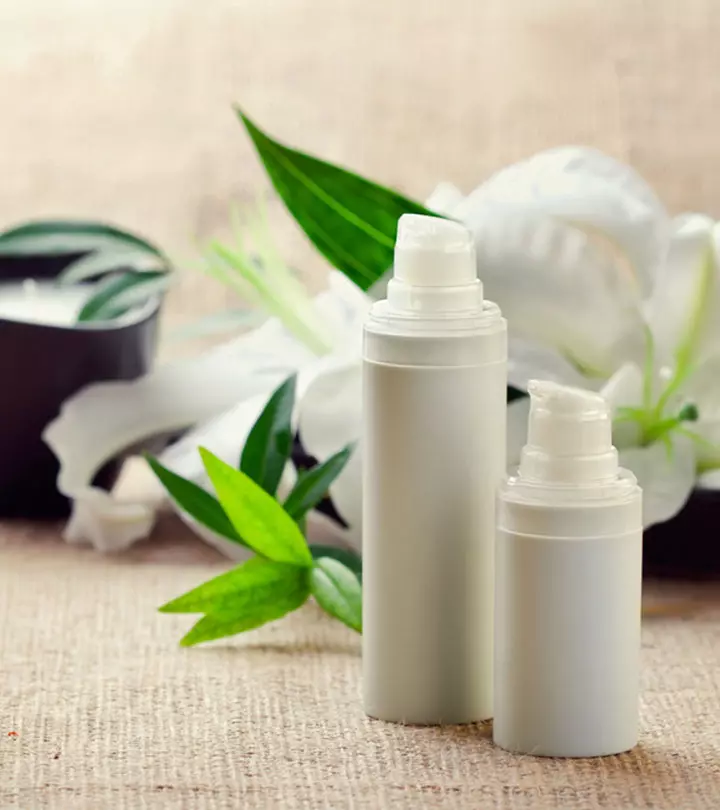


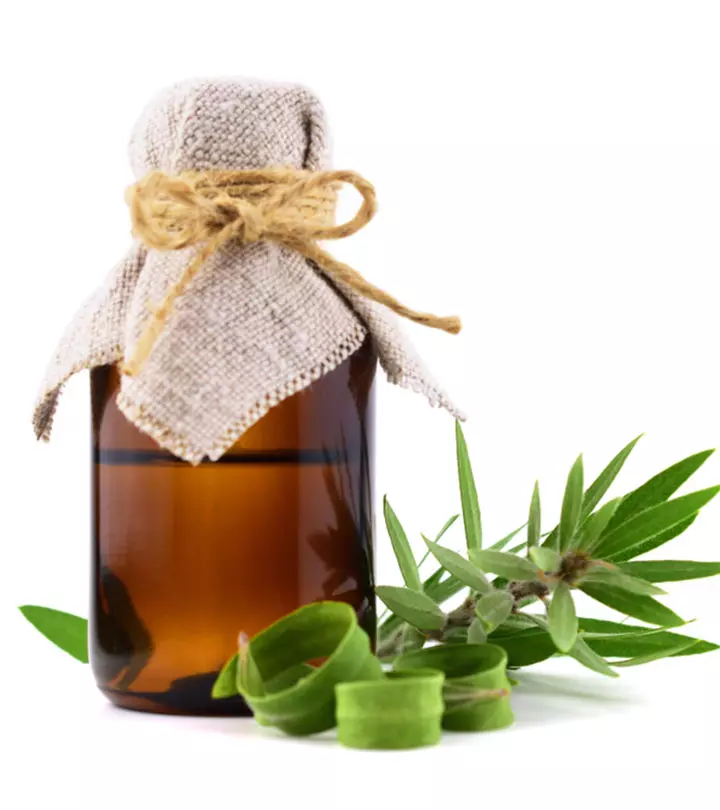
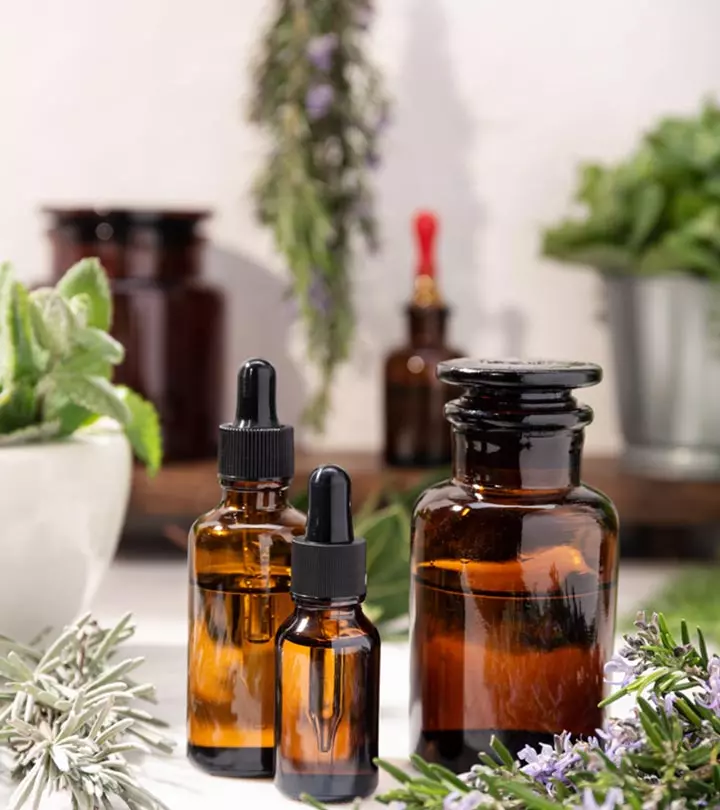
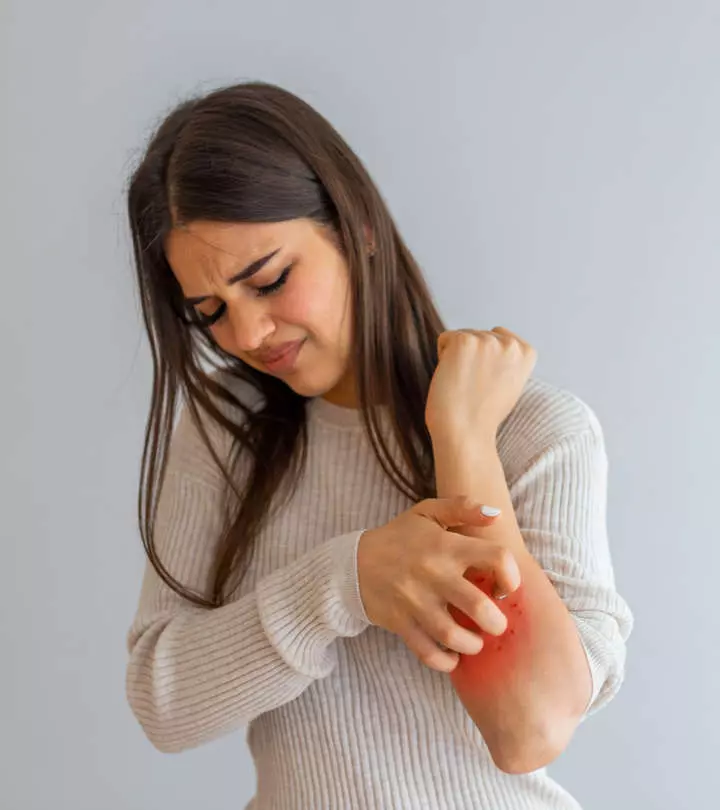


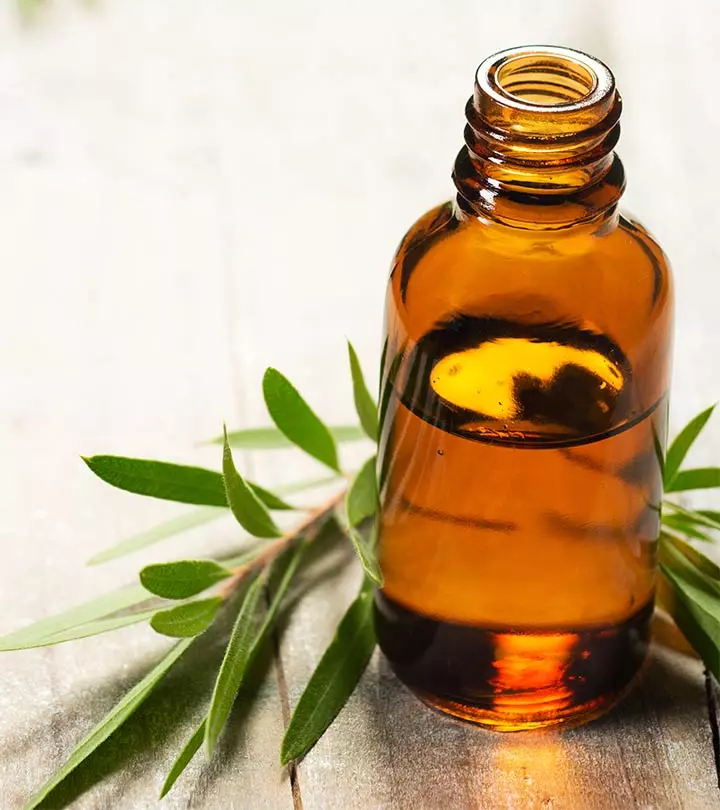

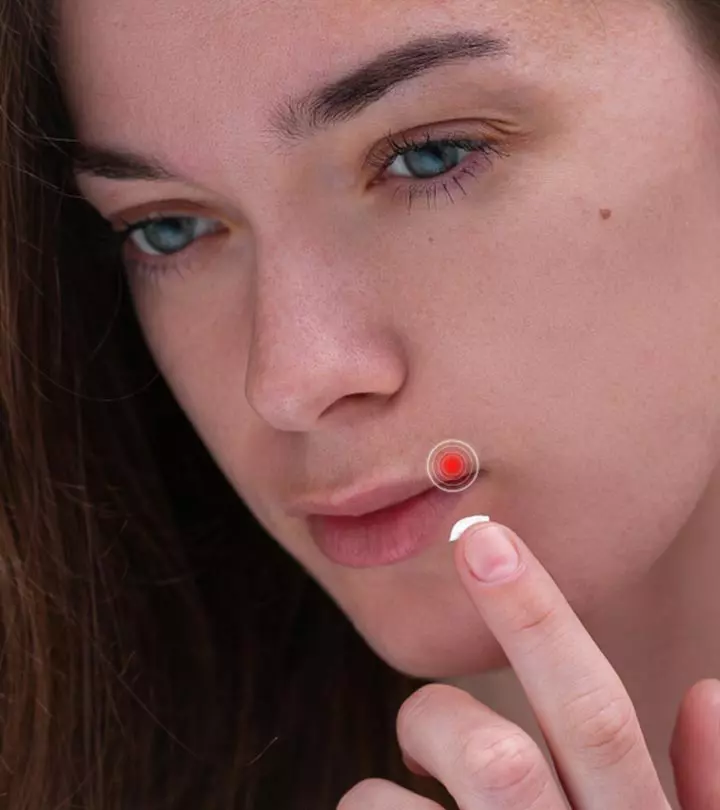


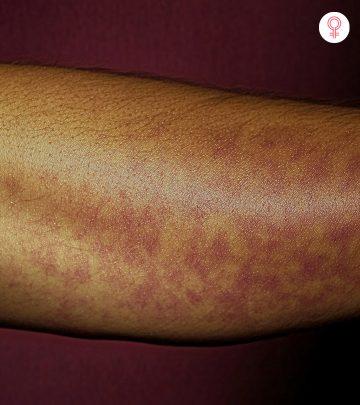



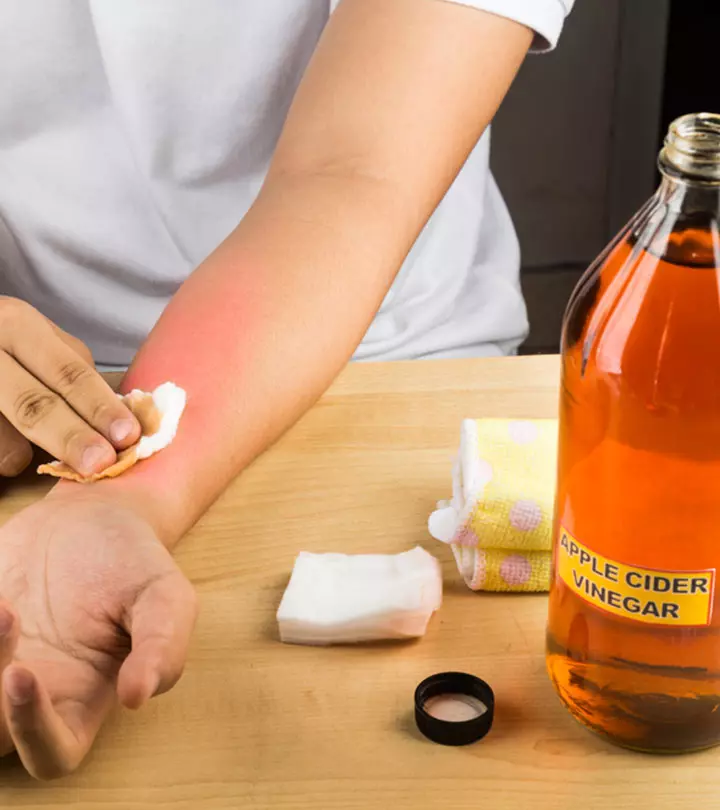

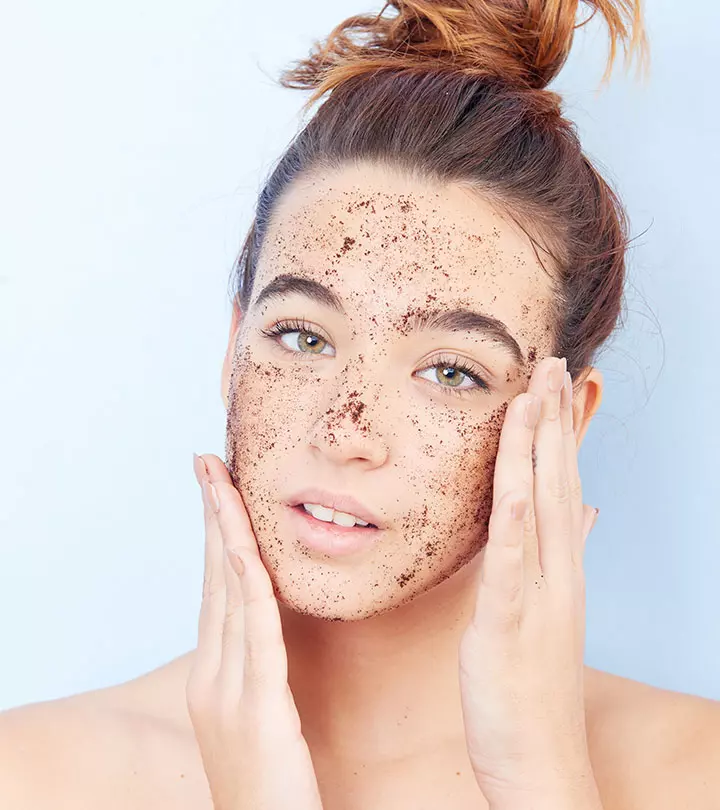

Community Experiences
Join the conversation and become a part of our empowering community! Share your stories, experiences, and insights to connect with other beauty, lifestyle, and health enthusiasts.